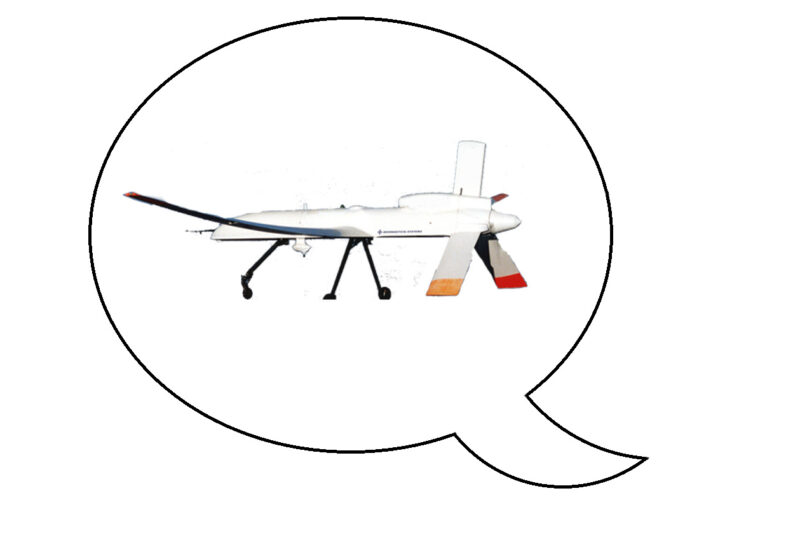
Representatives of the drone industry and other drone boosters often make a point of saying they don’t like to use the word “drones.” When my colleague Catherine Crump and I were writing our drones report in 2011, we talked over what terminology we should use, and decided that since our job was to communicate, we should use the term that people would most clearly and directly understand. That word is “drones."
Drone proponents would prefer that everyone use the term “UAV,” for Unmanned Aerial Vehicle, or “UAS,” for Unmanned Aerial System (“system” in order to encompass the entirety of the vehicle that flies, the ground-based controller, and the communications connection that connects the two). These acronyms are technical, bland, and bureaucratic. That’s probably their principal advantage from the point of view of those who want to separate them from the ugly, bloody, and controversial uses to which they’ve been put by the CIA and U.S. military overseas.
I suppose there is a case to be made that domestic drones are a different thing from overseas combat drones. Certainly, there’s a wide gulf separating a $17 million Reaper drone armed with Hellfire missiles and a hand-launched hobbyist craft buzzing around somebody’s back yard. But drone proponents themselves would be the first to say that drones are a tool—one that can be used for many different purposes. They can be used for fun, photography, science, surveillance, and yes, raining death upon people with the touch of a button from across the world. Even the overseas military uses of drones vary, including not just targeted killing but also surveillance and logistics.
Putting aside well-founded fears that even domestically we may someday see the deployment of weaponized drones, in the end, the difference between overseas and domestic drones is a difference in how the same tool is used. Regardless of whether you’ve got a Predator, a Reaper, a police craft, or a $150 backyard hobby rotorcraft, that tool is what it is. What it is is a drone.
I can’t touch on this subject without quoting from George Orwell’s famous essay “Politics and the English Language,” in which Orwell argued that bland and needlessly complicated language was a political act—a symptom of attempts to cover up things. “Such phraseology is needed if one wants to name things without calling up mental pictures of them,” he wrote. Defending the English language against such obfuscatory usages, he argued, requires writers to:
- Use “the fewest and shortest words that will cover one's meaning.”
- “Let the meaning choose the word, and not the other way around.”
- “Never us a long word where a short one will do.”
- “Never use a foreign phrase, a scientific word, or a jargon word if you can think of an everyday English equivalent.”
All of which back up our decision to stick with the word “drones.” In light of the overseas uses of drone technology, it’s worth noting Orwell’s conclusion:
Political language—and with variations this is true of all political parties, from Conservatives to Anarchists—is designed to make lies sound truthful and murder respectable.
If the word “drones” has horrible connotations, it’s because the technology has in fact been associated with horrible things. Many Americans may not pay attention, but when U.S. drones bring dismembering explosions down upon wedding parties, women, children, and other innocent civilians, they generate all the warm feelings and associations in those countries that the Boston Marathon bombing brought here.
In any event, if we change the word we use for drones and they continue to be used for such purposes, then the new word will just gain the same associations as the old. Linguists call that the “euphemism treadmill”—the process by which euphemisms lose their value as euphemisms and take on all the negative coloring of the original word. For example, the words “moron,” “imbecile,” and “idiot” were once neutral terms referring to specific levels of mental disability. They were replaced with the euphemism “mentally retarded”—but in time that has also come to be seen as offensive.
The good news for drone boosters is that the very fluidity of the meaning of words that makes a euphemism treadmill possible also means there is plenty of opportunity for the word “drone” to gain more positive connotations over time. If the technology does, in fact, bring benefits to our lives, and not just continue as a surveillance and killing tool, then the word will start to take on the warm and fuzzy tones its proponents would like.
Mainly we at the ACLU use “drones” because that is the clearest way to communicate. At the same time, if the word continues to carry a reminder that this is an extremely powerful technology capable of being used for very dark purposes, then that’s not necessarily a bad thing.


